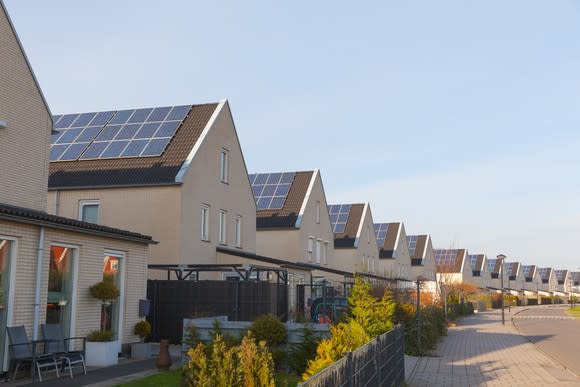Sunrun Is Growing in Residential Solar, but It's Facing Headwinds
Sunrun (NASDAQ: RUN) expanded aggressively in 2017, entering seven new markets and taking over the No. 1 spot in market share in residential solar from Tesla (NASDAQ: TSLA) by year end. Costs are also coming down, although that may slow as tariffs hit the industry in 2018, and pricing is stabilizing as competitors get weaker.
But Sunrun is facing a more challenging financing environment than it did just a few months ago. The company is trying to sell most of its project cash flows up front, leaving it vulnerable to rising interest rates or skittish investors. As rates rise in 2018, the value Sunrun is leaving for investors may be shrinking, and that could be a growing problem for the company. Here's a look at the good and the bad from the fourth quarter.

Image source: Getty Images.
Taking over the top spot in residential solar
Sunrun's deployments rose 10% versus a year ago in the fourth quarter to 85 MW, and the company said it generated $1.22 in unlevered net present value -- or the projected value of all cash flows before leverage like debt is added -- per watt installed. Creation costs fell $0.11 versus a year ago to $3.30 per watt, which is still higher than competitors like Vivint Solar (NYSE: VSLR) at around $3 per watt, but is coming more in line with the industry.
What's most interesting about the earnings report is the change in value being stored on the balance sheet. Sunrun should be seeing value rise, but in the fourth quarter, it fell (as you can see below) to $422 million of contracted net earning assets.

Image source: Sunrun Q4 2017 earnings presentation.
The drop in value was partly due to the timing of cash flows, but it also includes reserves against the impact of the tax reform bill that passed in December. But the fact that contracted net earning assets were only up $20 million in 2017 while cash on hand grew just $18 million means that it wasn't a great year for value generation overall.
How much value does Sunrun hold on its balance sheet?
One of the things Sunrun does is very aggressively value the assets it holds on the balance sheet. It's still discounting cash flows at a 6% rate, despite the fact that we've seen industry sales of residential solar assets from SunPower (NASDAQ: SPWR) and 8point3 Energy Partners (NASDAQ: CAFD) be valued at more like a 7% or 8% discount rate. And with interest rates rising, investors should take a more conservative look at valuing assets.
If we take Sunrun's gross earning assets under energy contract at an 8% discount rate ($1,252 million) and subtract the project level debt, lease-through obligations, and debt adjustments ($1,037 million), we get a good picture of the total net value of projects on the balance sheet. And based on those numbers, the contracted value on the balance sheet is just $215 million.
Sunrun will argue that there's between $438 million and $754 million in value for the renewal of solar leases after their initial 20-year term, but there's not yet any evidence that customers will renew leases, much less at prices anywhere near what Sunrun is charging for the initial contracted term. A conservative assumption is zero renewal value until there's evidence that renewals will occur. But taking out that large amount of value and giving cash flow an 8% discount rate undermines the seemingly rosy numbers Sunrun is reporting.
Headwinds ahead in residential solar
Sunrun is still growing, and expects to grow deployed solar another 15% in 2018. But it's also facing higher prices from solar tariffs, rising interest rates, and high acquisition costs for solar customers in today's market. Add all of them up, and I don't think Sunrun is a good value at an $800 million market cap given that it's barely generating value given reasonable valuation assumptions, and facing headwinds in the future. The history of companies growing into the No. 1 market share spot in residential solar isn't a good one, and Sunrun might be starting to see why.
More From The Motley Fool
Travis Hoium owns shares of 8point3 Energy Partners and SunPower. The Motley Fool owns shares of and recommends Tesla. The Motley Fool has a disclosure policy.

 Yahoo Finance
Yahoo Finance 